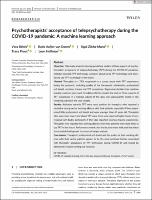Please use this identifier to cite or link to this item:
https://hdl.handle.net/20.500.12202/9329| Title: | Psychotherapists’ acceptance of telepsychotherapy during the COVID-19 pandemic: A machine learning approach |
| Authors: | Békés, Vera Aafjes-van Door, Katie Zilcha-Mano, Sigal Prout, Tracy Hoffman, Leon 0000-0003-2584-5897 |
| Keywords: | telepsychotherapy (TPT) COVID-19 pandemic Regression decision tree machine learning analyses vicarious trauma experiences. professional self-doubt |
| Issue Date: | Nov-2021 |
| Publisher: | Wiley |
| Citation: | Békés, V., Aafjes-Van Doorn, K., Zilcha-Mano, S., Prout, T. A., & Hoffman, L. (2021). Psychotherapists’ acceptance of telepsychotherapy during the COVID-19 pandemic: A machine learning approach. Clinical Psychology & Psychotherapy, 28(6), 1403–1415. https://doi.org/10.1002/cpp.2682 |
| Series/Report no.: | Clinical Psychology & Psychotherapy;28(6) |
| Abstract: | Abstract _Objective_ This study aimed to develop predictive models of three aspects of psychotherapists' acceptance of telepsychotherapy (TPT) during the COVID-19 pandemic, attitudes towards TPT technology, concerns about using TPT technology and intention to use TPT technology in the future. _Method_ Therapists (n = 795) responded to a survey about their TPT experiences during the pandemic, including quality of the therapeutic relationship, professional self-doubt, vicarious trauma and TPT acceptance. Regression decision tree machine learning analyses were used to build prediction models for each of three aspects of TPT acceptance in a training subset of the data and subsequently tested in the remaining subset of the total sample. _Results_ Attitudes towards TPT were most positive for therapists who reported a neutral or strong online working alliance with their patients, especially if they experienced little professional self-doubt and were younger than 40 years old. Therapists who were most concerned about TPT were those who reported higher levels of professional self-doubt, particularly if they also reported vicarious trauma experiences. Therapists who reported low working alliance with their patients were least likely to use TPT in the future. Performance metrics for the decision trees indicated that these three models held up well in an out-of-sample dataset. _Conclusions_ Therapists' professional self-doubt and the quality of their working alliance with their online patients appear to be the most pertinent factors associated with therapists' acceptance of TPT technology during COVID-19 and should be addressed in future training and research. |
| Description: | Research article / Open access |
| URI: | https://onlinelibrary.wiley.com/doi/10.1002/cpp.2682 https://hdl.handle.net/20.500.12202/9329 |
| ISSN: | 1063-3995, 1099-0879. |
| Appears in Collections: | Ferkauf Graduate School of Psychology: Faculty Publications |
Files in This Item:
| File | Description | Size | Format | |
|---|---|---|---|---|
| Aafjes-Van Doorn Psychotherapists' acceptance.pdf | 858.57 kB | Adobe PDF |  View/Open |
This item is licensed under a Creative Commons License

